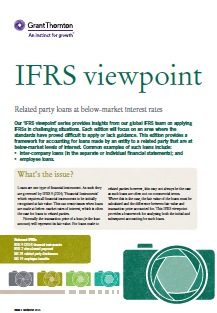Our ‘IFRS viewpoint’ series provides insights from our global IFRS team on applying IFRSs in challenging situations. Each edition will focus on an area where the standards have proved difficult to apply or lack guidance. This edition provides a framework for accounting for loans made by an entity to a related party that are at below-market levels of interest. Common examples of such loans include:
- inter-company loans (in the separate or individual financial statements); and
- employee loans.
Loans are one type of financial instrument. As such they are governed by IFRS 9 (2014) ‘Financial Instruments’ which requires all financial instruments to be initially recognised at fair value. This can create issues when loans are made at below-market rates of interest, which is often the case for loans to related parties. Normally the transaction price of a loan (ie the loan amount) will represent its fair value. For loans made to related parties however, this may not always be the case as such loans are often not on commercial terms. Where this is the case, the fair value of the loans must be calculated and the difference between fair value and transaction price accounted for.
This IFRS viewpoint provides a framework for analysing both the initial and subsequent accounting for such loans.


